
Charles Felix was the King of Sardinia and ruler of the Savoyard states from 12 March 1821 until his death in 1831. He was the last male-line member of the House of Savoy that started with Victor Amadeus I of Savoy, and caused the line of Victor Amadeus I's younger brother Thomas Francis, Prince of Carignano to seize the throne after Felix's death.
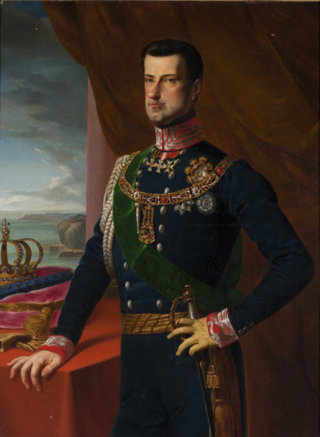
Charles Albert was the King of Sardinia and ruler of the Savoyard state from 27 April 1831 until his abdication in 1849. His name is bound up with the first Italian constitution, the Albertine Statute, and with the First Italian War of Independence (1848–1849).
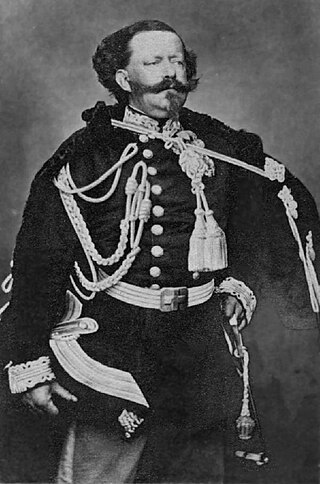
Victor Emmanuel II was King of Sardinia from 23 March 1849 until 17 March 1861, when he assumed the title of King of Italy and became the first king of an independent, united Italy since the 6th century, a title he held until his death in 1878. Borrowing from the old Latin title Pater Patriae of the Roman emperors, the Italians gave him the epithet of Father of the Fatherland.

Alberto Ferrero La Marmora was an Italian soldier and naturalist. He was elder brother to Alessandro Ferrero La Marmora, soldier and founder of the Bersaglieri, and to Alfonso Ferrero La Marmora, Italian general and statesman.
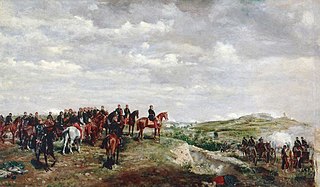
The Second Italian War of Independence, also called the Sardinian War, the Austro-Sardinian War, the Franco-Austrian War, or the Italian War of 1859, was fought by the Second French Empire and the Kingdom of Sardinia against the Austrian Empire in 1859 and played a crucial part in the process of Italian Unification.

Armando Diaz, 1st Duke della Vittoria, was an Italian general and a Marshal of Italy. He is mostly known for his role as Chief of Staff of the Regio Esercito during World War I from November 1917. He managed to stop the Austro-Hungarian advance along the Piave River in the First Battle of Monte Grappa. In June 1918, he led the Italian forces to a major victory at the Second Battle of the Piave River. A few months later, he achieved a decisive victory in the Battle of Vittorio Veneto, which ended the war on the Italian Front. He is celebrated as one of the greatest generals of the war.

Emanuele Francesco Maria dei Principi Ruspoli, 1st Prince of Poggio Suasa was an Italian and a Prince of the Holy Roman Empire who twice served as the mayor of Rome.

Umberto I was King of Italy from 9 January 1878 until his assassination in 1900. His reign saw Italy's expansion into the Horn of Africa, as well as the creation of the Triple Alliance among Italy, Germany and Austria-Hungary.
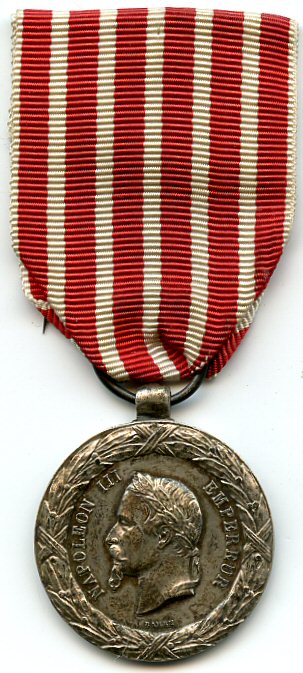
The Commemorative medal of the 1859 Italian Campaign was a French commemorative medal established by Napoleon III, following the 1859 French campaign in Italy during the Second Italian War of Independence.
Marshal Guglielmo Pecori Giraldi, OSSA, OSML, OMS, OCI was an Italian noble, general and politician, mostly known for commanding the Italian 1st Army during World War I.
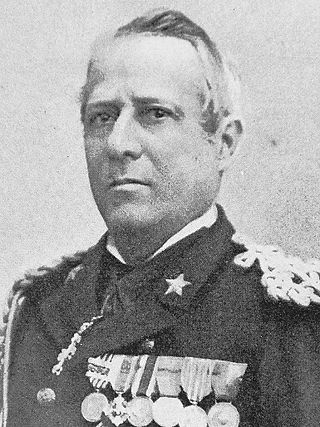
Felice Napoleone Canevaro was an Italian admiral and politician and a senator of the Kingdom of Italy. He served as both Minister of the Navy and Minister of Foreign Affairs and was a recipient of the Order of Saints Maurice and Lazarus. In his naval career, he was best known for his actions during the Italian Wars of Independence and later as commander of the International Squadron off Crete in 1897–1898.

Gustavo Fara was an Italian general and politician.

Alessandro Asinari di San Marzano (1830-1906) was an Italian politician, general, and Senator of the Kingdom of Italy

Carlo Petitti di Roreto (1862-1933) was an Italian general who was most notable during his service in the Italo-Turkish War and World War I.
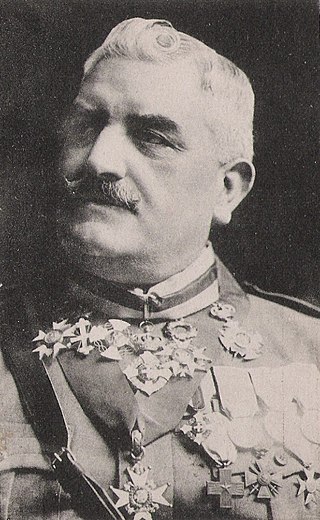
Giuseppe Pennella (1864-1925) was an Italian Lieutenant General who was a highly decorated officer of the Royal Italian Army. During the First World War he held very high positions, commanding in succession: the "Grenadiers of Sardinia" Brigade, 35th Division, XI Army Corps, 2nd Army, 8th Army and the XII Army Corps. At the head of the 35th Division he operated in the Macedonian front, but was exonerated from command at the request of the French general Sarrail who was commander of the Armée d'Orient, as both had a strong disagreement over command.

Guido Biscaretti di Ruffia was an Italian soldier and politician.
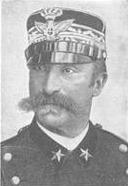
Giuseppe Ottolenghi (1838–1904) was an Italian general and politician.
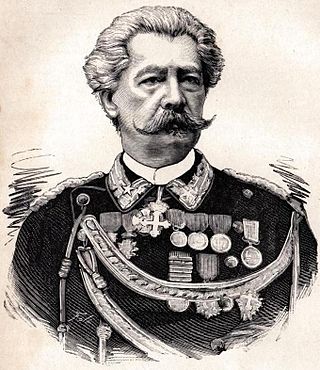
Count Gustavo Mazè de la Roche was an Italian general and politician. He was a senator of the Kingdom of Italy and Minister of War in the third Depretis government.
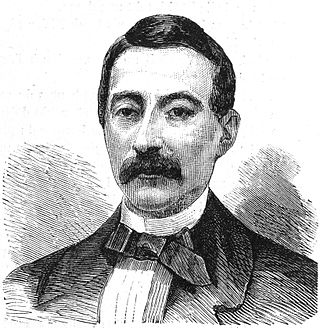
Agostino Petitti Bagliani, Count of Roreto was an Italian general and politician of the Risorgimento.

Carlo Alberto Racchia was an Italian admiral and politician. He served as was Minister of the Navy of the Kingdom of Italy in the first Giolitti government.



















